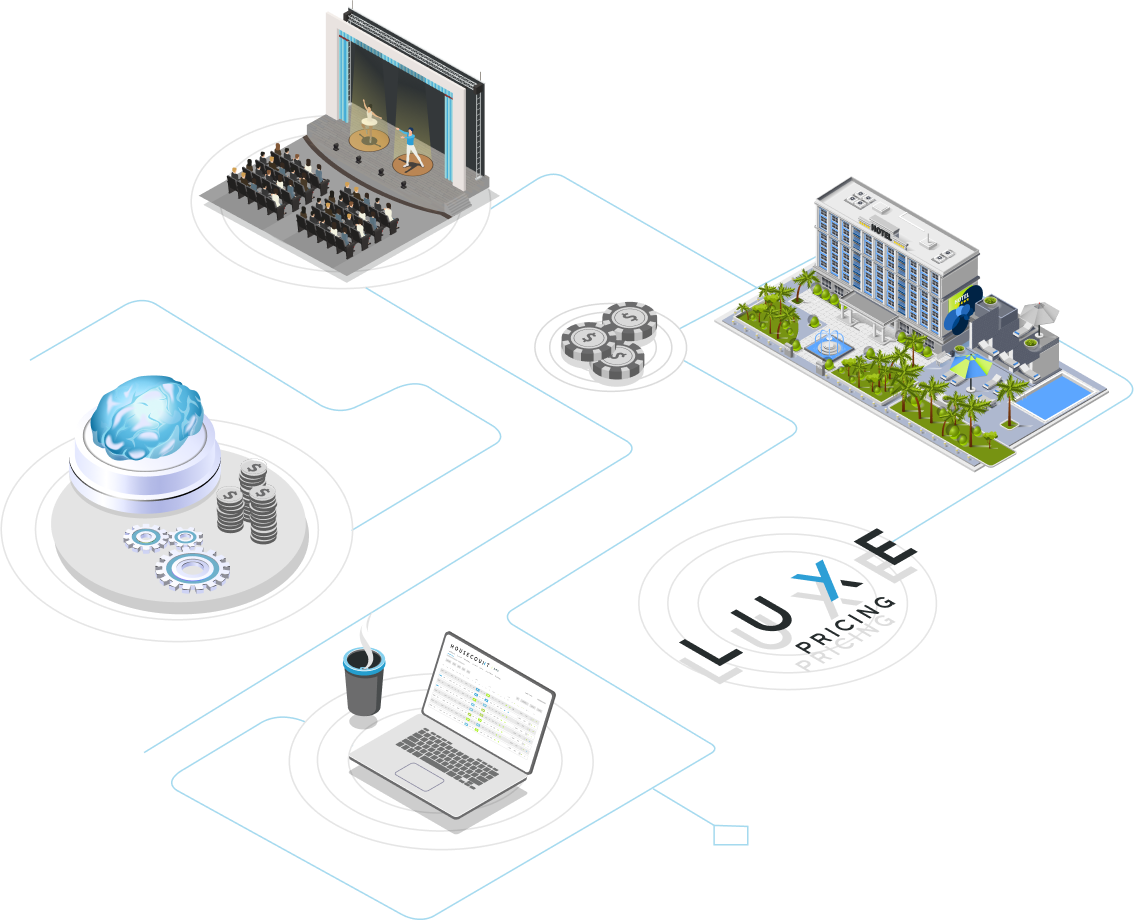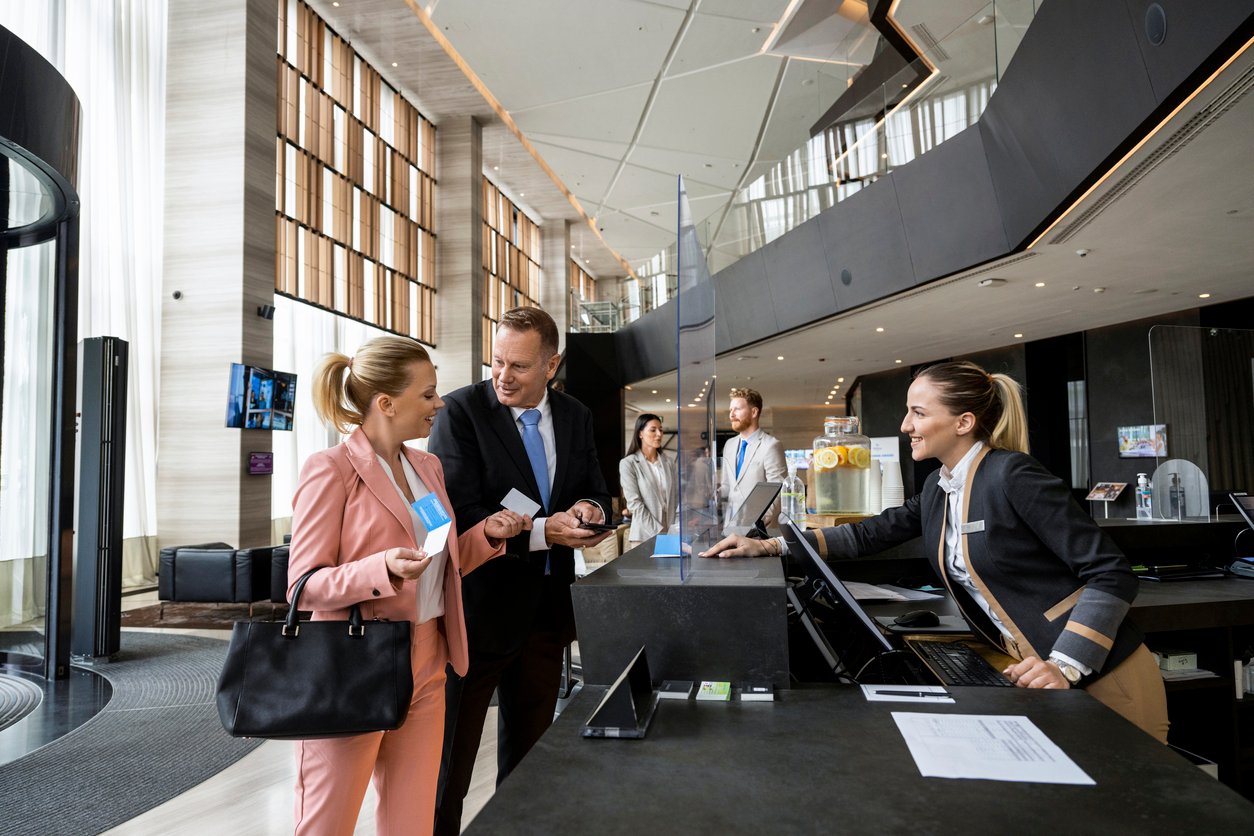A Guide to Hospitality Technology: What You Need to Know
According to a recent study, around 58% of businesses implementing emerging technologies have been able to grow their...
Table of Contents
Part of running a successful hotel involves staying up to date with hotel technologies and trends. In fact, 93% of hotels have seen increased efficiency due to implementing hotel technologies in their businesses.
If you’re not already implementing these technologies, you’re missing out on some big benefits. That’s why getting on board and staying savvy with what’s changing in the hotel industry is so important.
This guide goes over a few hotel technologies that can boost revenue, improve efficiency, and have other major implications for hoteliers.
Hospitality management and hotel technologies needed to emerge and evolve for the industry to survive. Aside from ensuring hotels remain operational amidst the adverse effects due to the pandemic, these new hotel techs are also customer-focused.
Customers are the hotel’s priority, and utilizing the latest trends and tech is essential for hotels to improve their customer relationships.
New hotel techs include e-commerce, IT, and other technology solutions in the hospitality industry. Using these techs is mainly for two things:
Utilizing hotel technologies can also increase your hotel’s automation capabilities with regards to administrative and certain workflow tasks, easing your employees’ overall workload. And because processes are automated and faster, you can save more time and money.
The hospitality industry is taking a step forward in coming up with tech solutions to improve how hotels manage their customers for an enhanced consumer-based experience. Let’s look at some of the most common emerging techs in the industry:
Voice search has become popular in many hotels, cafes, and restaurants. It provides customers ease of use and fast navigation. Your hotel website should also be fully functional with a well-structured voice search.
Hotels can benefit from voice control by installing smart speakers in suites and rooms for controlling in-room devices or taking orders from on-site restaurants and cafes. This means customers no longer have to leave their rooms and wait in long lines to get food, and it also prevents them from having to call room service directly.
The hospitality industry is also generating moves toward using robotics in hotels and on-site restaurants. Robots can now function as hotel staff and perform human tasks. They can also take on concierge roles to welcome guests and provide them with hotel information.
Housekeeping robots have also been popular. These robots perform sanitization and room cleaning, including germ-killing and vacuum cleaning. All of those services reduce manual labor and related costs to hoteliers.
Contactless payments are some of the first trends to emerge in the hospitality industry. Aside from use in hotels, they have been the standard for most restaurants, cafes, and bars. While contactless payments help improve customer satisfaction and speed up payment processes, they are also primarily connected to loyalty programs.
Contactless payments also mean customers can pay using their mobile phones. That means they don’t need to worry whenever they forget to bring their credit card or wallets. And while the pandemic is still present in some areas of the world, contactless payments are a great way to decrease contact between people by eliminating the need for multiple people to touch the same card or cash.
The hospitality industry is one of the most competitive fields. It’s the main reason new techs and trends have emerged over recent years. Thanks to technology, hotel businesses can perform the following seamlessly:
Moreover, the latest technology trends can ensure accuracy in tasks challenging for hotel staff to accomplish, primarily since technology means automation. These trends help hotels meet client demands to build trust and better personal connections.
Remember that you have a wide range of competitors in the hospitality industry. And it’s one of the main reasons you should utilize emerging technologies in the field. Using technologies allows your hotel to keep up with your competitors, giving your brand a significant advantage.
Also, because of the evolving trends with regard to customers and the hospitality industry, more customers will expect to see better technology being utilized at the hotels they stay at. You should make sure your hotel is one of them. And when you adopt the latest trends, you allow your hotel to be progressive.
Because your business is part of the hospitality industry, satisfying your guests should be your priority. With the following hotel technologies, your clients are guaranteed to have a seamless and convenient stay with your available accommodations.
Hotel technologies can be divided into three main categories: hotel room, self-service, and recognition. The below table breaks down examples of each type of technology.
|
Hotel Technology |
Example |
|
Hotel Room Technology |
|
|
Self-Service Technology |
|
|
Revenue Management Technology |
|
|
Upselling Software Technology |
|
|
Recognition Technology |
|
Everybody wants to experience seamless hotel accommodation to relax and unwind. And when your hotel rooms utilize the latest tech trends listed below, you’re off to a great start. These trends can help you save money, meet your guests’ expectations, and more.
Web-based applications for room service can totally change your guests’ overall experience, especially since they are compatible with mobile devices and laptops. These apps allow guests to simply type the web address or scan your hotel’s QR code.
Room service apps become your guests’ best friends when checking in. They can use these applications to order food deliveries, request housekeeping services, and inquire about hotel information.
For most guests, room temperature matters because it greatly affects their overall stay. Thankfully, brands like Angie by Nomadix are changing the hotel industry.
Equip your rooms with built-in sensors which can detect when the room has been empty for a long time. This prompts the device to switch the lights off and regulate the temperature. Your hotel is upping the game for your guest and saving more energy.
Another advantage of voice-controlled and touchscreen thermostat adjustment is the convenience of not getting up from bed and adjusting the room temperature in the middle of the night. You can simply shout the thermostat you desire, and Angie does everything for you.
Generally speaking, statistics reveal more than 56% of guests are not fans of having walking robots in hotels, especially when they’re sleeping. But everything can change once you persuade them that service robots can accomplish more good than harm.
Moreover, service robots can make your hotel staff’s lives much easier. They can deliver food to your room and perform basic laundry services and other tasks of regular employees. This allows your team to be productive in different aspects, saving more time.
The emergence of smart bathrooms from various brands include the following features:
Most hotels started to count on self-service technologies because they want the best for their guests. And if you want to keep up with the changes, it’s time to get to know what these technologies are and what they can do for your business.
Check-in kiosks might be the greatest invention to speed up guests’ hotel check-in process. Today, most hotels allow guests to use their contactless cards containing all the needed information. All they need to do is click on the kiosk’s screen, show their identification cards and proofs of payment, and everything is set.
Installing check-in kiosks also allows hotels to conveniently stay open for longer without requiring employees to manage overtime.
Despite these benefits, one thing to keep in mind is that Kiosks have their drawbacks. For example, they can sometimes lead to reduced upsell revenue. However, Luxsell URS can help you avoid this from happening and ensure that you continue to build upsell income.
From upsell opportunities to accurate price management, Luxe Pricing is here to maximize your revenue.

Chatbots help hotels improve their operations. These computer programs act as humans guests can communicate with, regardless of the time of the day. Aside from companies in the hospitality industry, brands utilize chatbots and make them part of their marketing strategies.
The main advantage of chatbots includes getting information guests need for their hotel reservations, ordering food from on-site restaurants, and receiving weather updates.
But aside from improving customer service, some hotels utilize chatbots to enhance the communication between guests and staff members. Some hotels use chatbot technology to reserve conference rooms and receive notifications of upcoming events at the hotel.
One example is ChatGPT, a chatbot that’s trained to learn what humans mean when they ask specific questions. This can help revolutionize interaction with guests, improving guest satisfaction overall.
Recognition technology is one of the standard biometric technologies emerging in the hospitality industry. Through this innovation, hotels can identify people better through facial analysis. All it takes is a quick scanning of an image or a particular frame in a video, and the tech can match the features in no time.
A common feature of recognition technology is security and access. Hotels use the technology to verify guests before granting them access to hotel rooms. Security through recognition technology has also helped several hotels deal with troublesome guests or ban guests from the property.
Some hotels are now offering keyless entry to rooms using a mobile app. This eliminates the need for traditional hotel keys, which can easily get lost, putting guest security at risk. Instead, all clients need is their mobile device to gain access to their room.
A few examples of keyless entry companies include:
The recognition technology also allows hotels to verify payment through facial recognition. This helps establishments enable payment authorizations, improving efficiency and productivity. Guests can verify their payment using their phone or the hotel’s on-site camera.
When hotels have check-in kiosks available, guests can use facial recognition to check in and confirm payment without speaking with hotel staff. The same recognition tech can also be used in hotels’ on-site restaurants.
Recognition technology can also be utilized to improve your customer service. Through facial recognition, your staff can quickly identify guests upon checking in. This also allows your hotel to create personalized greetings and tailored services.
You can also take advantage of facial recognition to reward returning customers. Because your tech easily identifies them, it’s easy to classify which hotel guests will be rewarded for staying loyal to your hotel.
Facial recognition also works with conducting market research to achieve information about guests needs, helping improve the client experience. The technology allows hotels to learn more about the hospitality industry and how they can improve their services for their guests.
Facial recognition can also create impressions and conclusions about your guests. You can use the tech to predict your guests’ mood, age, and gender. Additionally, you can receive information regardless of the time and day.
You can basically experience the advantages of Artificial Intelligence with a simple click of a button. And even in hospitality management, artificial intelligence is extensively utilized to perform traditionally human functions much faster.
Aside from speeding up processes, artificial intelligence also helps hotels save more money and eliminate potential human errors that could affect productivity.
Even though not all hotels have relied on artificial intelligence, it has been engaged in several practical applications, like the ones outlined below:
With artificial intelligence, even small hospitality providers can lead the game and be competitive. It’s a potential equalizer that should serve as the core of your software system for automating check-ins and outs, room assignments, and housekeeping deliveries.
Artificial intelligence allows you to improve response time, reduce costs, improve customer satisfaction, and increase your hotel’s revenue. It can also help improve hotel revenue management, enabling you to get more from your current cash flow.
Leveraging technology in the hospitality industry generally improves your staff’s communication with guests to help improve their overall experience. Moreover, techs and trends can help streamline operations faster to comply with the recent protocols.
Here are five benefits why your hotel should consider utilizing technology in your management and operations:
|
Benefit |
Explanation |
|
Enhance Operational Efficiency |
Through the use of ERP systems, hotels can boost operational efficiency |
|
Reduce Costs |
Allows you to allot your resources to other important matters |
|
Lower Staff Workloads |
Can enable your employees to make their time more valuable by accomplishing other relevant tasks |
|
Increase Revenue Generation Potential |
Increase your overall sales and drive more customers to try your hotel |
|
Improve Customer Experience |
Attract new customers while allowing your old ones to come back |
Aside from guests, hotels should leverage technology for their own sake, this includes managing their inventory, human resources, and purchases. ERP systems are all-in-one solutions to manage operations and processes across your hotel’s departments.
Thanks to technology, it’s easy to manage daily activities for your team, including supply chain, accounting, and managing workforce or projects. Your team can handle vital business functions in full capacity so leaders and team heads can constantly review released reports and business information.
The main goal of technology is to automate processes, reducing the need for employees to work more to finish the tasks. It’s the same for techs used in the hospitality industry. It’s typical for technology to utilize AI and automation. This means less work for your employees, allowing them to focus more on other valuable tasks.
When guests are satisfied with their experience at your hotel, they are likely to return. Moreover, there’s a high chance these guests will recommend your hotel to their friends. This is essential in the industry, especially when you have a growing number of competitors.
Returning customers means more income. The same is true when you get new ones. Hotels that implement new technology can increase returning clients and attract new customers at the same time, ultimately leading to an increase in hotel revenue.
One way to achieve these returning customers is by implementing revenue automation systems such as Luxe Pricing. Luxe Pricing offers, among other things, custom revenue management sessions that include a number of features designed to help boost revenue. This service includes:
It also includes metrics and analytics so that your team can track what’s working and what’s not, helping increase revenue and ensure maximum bookings.
As previously mentioned, having returning guests means they have an outstanding customer experience. And with the help of technology, you can guarantee your hotel to provide exceptional services to everyone.
One way to enhance customer experience is by using technology that allows you to automatically save the preferences of your guests, including the following:
These saved preferences make it easier for your hotel to comply with what your guests want the next time they return. And because it’s personalized, your guests will appreciate these tailored services catered to their preferences.
Technology is reshaping how everything works in the hospitality industry. And if you don’t rely on it, you will certainly fall behind your competitors.
As years progress, changes and the emergence of the following tech trends are what you should look out for as a hotel owner:
Even though several hotels have started to count on technology to speed up operations and make their hotel staff’s lives easier, there are still a few skeptics.
If you happen to be one of them, here are some of the most common myths about new hotel tech.
Technology will improve your lives and make your businesses thrive easier. But don’t be mistaken by believing that it will take away the jobs of your hotel staff, especially when you utilize robots in providing human services.
The truth is that technology is merely a tool you can use to speed up processes and improve efficiency. Let’s talk about PMS or property management systems, for example. Through this technology, it’s easier to track and maintain guest records. But before it became widely used, hotel staff had to encode each record manually.
But thanks to the automation afforded by PMS, all it takes is a simple scanning of the OCR code to retrieve needed data. This allows hotel staff to focus more on other tasks that can improve the guest experience. Moreover, PMS did not actually take away the staff’s job as front-desk personnel.
Getting revenue management systems and hiring revenue managers can totally up your game in the industry. However, some hoteliers believe revenue management can be one of the following:
However, in reality, all hotels need revenue management, regardless of whether it’s a budget or a high-class hotel. These systems can help boost your property’s revenue providing a tremendous ROI and minimal effort to get started.
Luxe Pricing offers powerful yet budget-friendly RMS solutions with flexible pricing. These plans are highly customized depending on your average tariff, requirements, property size, and more.
Hoteliers often use promotions and discounts as a tool to bring more guests in. While this can be effective, how much is enough?
Discounts and promotions can be great, but if you keep providing discounts, guests will likely ask for them again the next time they check your property. Once guests become overly conditioned for discounts, it can be hard to unwind, and long-term profit can suffer. And when there are no promotions, your guests may begin to look elsewhere.
Instead, discounts and promotions should be used sparingly and, when able, supplemented with discounts through packages. Create plans that combine room rates, activities, meal plans, paid services, and more. Doing this lets your guests realize that these are more valuable than normal promotional room discounts.
Most hoteliers believe that if they continue to imitate how well their competitors are doing, they can survive the competition. They often think copying their competitors’ marketing strategies and offers can attract more guests.
However, even when you have several competitors, always remember that each hotel boasts uniqueness guests won’t be able to find in other accommodations. Your hotel will have different room interiors, services, offerings, and facilities. And you should use these aspects to your advantage.
This also means the strategies that work for your competitors won’t always work the same for you. Moreover, guests are now searching for more unique hotels that can provide them with exceptional services they have never experienced.
With emerging software and systems to improve organizations and operations across various fields, the hospitality industry should also hop on the trend. Technology trends have enabled hoteliers to boost revenue, streamline operations, and increase customer satisfaction.
Implementing new hotel technology allows you to enjoy benefits like lowering your staff’s workloads, improving operational efficiency, and improving your customers’ overall experience. Always remember that utilizing technology will not take away more jobs but instead allow your staff to allot more time to accomplish more tasks valuable to both your hotel and your guests.
One such hotel technology is Luxe Pricing, an efficient software for operations and revenue management in the hospitality industry. Thanks to artificial intelligence and automation provided through the software, it’s easier for hoteliers to know more about their real-time profits and generate upgrade offers for your guests. Get in touch to learn more about Luxe Pricing and its offers to hoteliers today.
From upsell opportunities to accurate price management, Luxe Pricing is here to maximize your revenue.





Get Hooked! Sign Up to get the latest catch sent to your inbox.
According to a recent study, around 58% of businesses implementing emerging technologies have been able to grow their...
Hotels have several departments running different operations. So, what’s the best way to keep tabs on everything that’s...
Robots, advanced machine learning, and intelligent computer systems are just some of the innovations invented and...